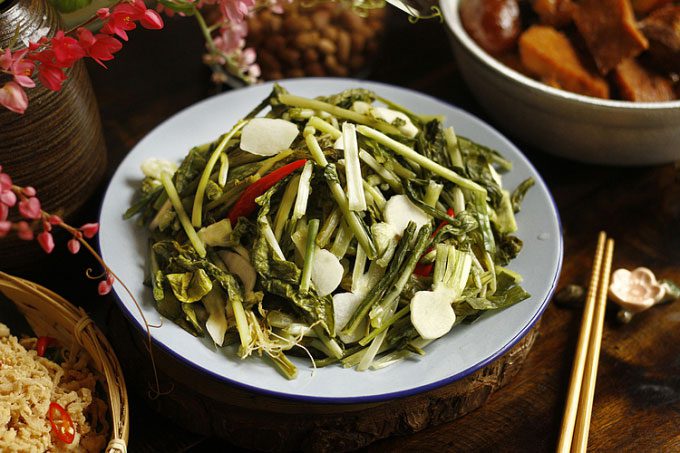Eating freshly pickled vegetables, consuming contaminated pickles, or indulging in excessive amounts can harm health and increase the risk of poisoning, especially for individuals with digestive system disorders.
Traditional medicine practitioner Bùi Đắc Sáng from the Academy of Science and Technology and the Hanoi Oriental Medicine Association states that no Tet feast is complete without pickled mustard greens and salted onions to balance dishes like sticky rice cake and fatty pork. Pickled vegetables also contain probiotics, beneficial bacteria that stimulate digestion, support intestinal function, and enhance the immune system. If consumed correctly, pickled vegetables do not negatively impact health.
However, many people consume them improperly, which can be harmful, such as:
Eating Freshly Pickled Vegetables
Associate Professor Dr. Nguyễn Duy Thịnh, a former official at the Institute of Biotechnology and Food Technology, Hanoi University of Science and Technology, explains that the pickling process involves a reaction that converts nitrate (a residue in vegetables due to urea fertilizer or high-nitrate soil) into nitrite. During the first 2-3 days of pickling, nitrite levels increase, then gradually decrease and disappear when the pickles turn golden. Nitrite reacts with amino acids in the body to form nitrosamines, which pose a cancer risk. Therefore, for health reasons, you should avoid eating freshly pickled vegetables.
Consuming Unsafe Pickles
For thousands of years, Asian countries have utilized various vegetables for pickling, becoming a culinary tradition in many nations. Pickled mustard greens are popular as a side dish, prepared by creating a salty environment for fermentation by microorganisms. Through fermentation, harmful microorganisms are inhibited, allowing the vegetables to be preserved for longer. However, pickled vegetables may be contaminated with pesticides during cultivation, which can lead to food poisoning, so caution is necessary.
Dr. Thịnh notes that pickled mustard greens are typically salty, and healthy individuals should consume about 5 mg of salt per day. It’s advisable to use clay or ceramic tools for pickling and to avoid plastic containers.

Pickled vegetables are a popular dish during Tet to prevent heaviness. (Photo: Bùi Thủy).
Who Should Avoid Pickled Vegetables?
Dr. Nguyễn Trọng Hưng from the National Institute of Nutrition states that pickled vegetables also pose health risks, especially for certain individuals who should avoid them.
Firstly, individuals with stomach diseases should be cautious. Pickled vegetables and salted onions contain high levels of acid due to fermentation. Consuming excessive salted onions can lead to increased gastric acid secretion, affecting the internal mucosa and exacerbating inflammation or ulcers.
Secondly, individuals with kidney disease or high blood pressure should also refrain from consuming pickled vegetables. Fermented pickled mustard greens contain a significant amount of salt. The recommended daily salt intake is about 5 g, which varies based on body weight, gender, and age.
Those with kidney disease or high blood pressure need to reduce salt intake compared to healthy individuals. Consuming too much pickled vegetable can lead to excessive sodium intake, increasing the risk of hypertension and kidney issues. Particularly, patients with kidney failure have poor sodium excretion ability, so eating pickled vegetables can cause sodium retention, leading to edema and increased blood pressure.
Pregnant women should not consume excessive salted onions or pickled mustard greens. During pregnancy, a mother’s digestive system becomes sensitive, especially during morning sickness. Eating sour pickles can trigger feelings of fullness and nausea. In the final months of pregnancy, it is advisable to consume bland foods to avoid edema and pregnancy-related toxicity.
Additionally, pickled vegetables have a characteristic pungent taste. Consuming too much can lead to bad breath and body odor, as the compounds in onions can be absorbed and excreted through sweat glands.
Dr. Hưng recommends against eating large amounts of pickled vegetables that have an unusual smell or appear yellow, suggesting smaller portions each time and avoiding continuous consumption.
Moreover, it’s better to make your own pickles rather than buying them from stores. Homemade pickles allow you to control the amount of salt added and ensure the food is clean, free from additives and preservatives, using clean utensils. Be cautious not to return leftover pickles to the jar, as this can spoil the remaining contents; use clean spoons or chopsticks to serve pickles; seal the jar tightly and store it in the refrigerator.


















































